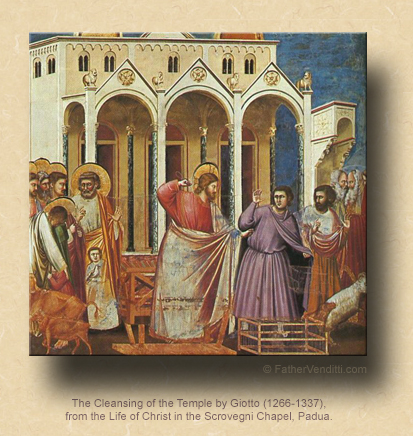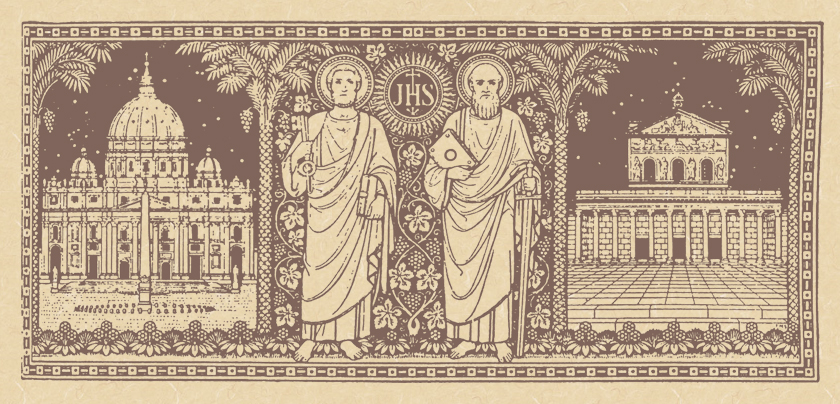What's Wrong with the Protestant Version of Jesus?
In the United States:
The Thirty-Third Friday of Ordinary Time; the Memorial of the Dedication of the Basilicas of Saints Peter & Paul, Apostles; or, the Memorial of Saint Rose Philippine Duchesne, Virgin.*
Lessons from the secondary feria, according to the ordinary form of the Roman Rite:
• Revelation 10: 8-11.
• Psalm 119: 14, 24, 72, 103, 111, 131.
• Luke 19: 45-48.
|
When a Mass for the memorial of the Dedication is taken, lessons from the proper:
• Acts 28: 11-16, 30-31.
• Psalm 98: 1-6.
• Matthew 14: 22-33.
|
|
When a Mass for the memorial of the Virgin is taken, lessons from the feria as above, or any lessons from the common of Virgins for One Virgin.
|
|
Outside the United States:
The Thirty-Third Friday of Ordinary Time; or, the Memorial of the Dedication of the Basilicas of Saints Peter & Paul, Apostles.
Everything as above, excluding anything regarding the memorial of the Virgin.
|
The Third Class Feast of the Dedication of the Basilicas of Saints Peter & Paul.
Lessons from the common "Terríbilis est…" for the Dedication of a Church, according to the extraordinary form of the Roman Rite:
• Apocalypse 21: 2-5.
• [Gradual] Locus iste…**
• Luke 19: 1-10.
The First Friday of Philip's Fast; and, the Feast of the Holy Martyrs Plato & Roman.***
Lessons from the pentecostarion, according to the Ruthenian recension of the Byzantine Rite:
• II Timothy 2: 1-2, 8-18.
• Luke 18: 15-18; 17: 1-4.
FatherVenditti.com
|
 7:55 AM 11/18/2016 — For some peculiar reason, the episode of our Lord throwing the money changers out of the Temple is a very popular image of our Lord, probably because it caters to the very Protestant notion that loves our Blessed Lord but hates the institution of organized religion, founded on the curmudgeonly notion that every large institution exists basically to make money. In this narrow minded perspective, the vendors in the temple area represent to us those who use religion to make a profit, and our Lord driving them out stands for the moral purity of those who love God but hate any kind of religious officialdom. It dovetails nicely with the anti-Catholicism which has always been a part of the American experience, which encourages this idea that true Christianity has nothing to do with the institution of the Church. 7:55 AM 11/18/2016 — For some peculiar reason, the episode of our Lord throwing the money changers out of the Temple is a very popular image of our Lord, probably because it caters to the very Protestant notion that loves our Blessed Lord but hates the institution of organized religion, founded on the curmudgeonly notion that every large institution exists basically to make money. In this narrow minded perspective, the vendors in the temple area represent to us those who use religion to make a profit, and our Lord driving them out stands for the moral purity of those who love God but hate any kind of religious officialdom. It dovetails nicely with the anti-Catholicism which has always been a part of the American experience, which encourages this idea that true Christianity has nothing to do with the institution of the Church.
I like to throw cold water on these popular misconceptions by taking people back to the feast of the Presentation: Mary and Joseph take the Baby Jesus to the Temple because the Law of Moses requires that every first born male be presented to God along with two pigeons or a pair of turtle doves. The whole point of the inclusion of the episode in the Holy Gospel—and the Church's celebration of it—is to show the obedience of the Holy Family, and our Lord, to the requirements of the Law, a lesson that our Lord would reenforce several times in His own preaching throughout his public ministry, particularly when he said, “Do not think that I have come to set aside the law and the prophets; I have not come to set them aside, but to bring them to perfection” (Matt. 5: 17 Knox). It was essential, even to our Lord, Himself, that this law be fulfilled; so, where did Joseph get the two birds for the sacrifice? He bought them from a vendor in the Temple, the same kind of vendor that our Lord drives from the Temple in today's Gospel lesson.
So, the Sunday School interpretation of our Lord's actions, that it's wrong for the Church to make money, simply doesn't pass muster. Of course the Church has to make money, otherwise it couldn't exist in the real world; and, if the Church doesn't exist in the real world, then there are no priests, there is no Mass, there are no sacraments, and Grace is not available to us … unless, of course, you're a Protestant who doesn't believe in the priesthood, the Mass, the sacraments or grace.
Our Lord drives the vendors from the outer court of the Temple not because it's wrong for someone to do that kind of work;—without them, people would not be able to perform their religious duties before God—He drives them out because they're doing it in service to the wrong religion. The Blessed Apostle John's account of this event is much more detailed,  and includes the rather heated exchange our Lord has with the temple elders right after He knocks over the tables of the vendors; and, when they ask our Lord to justify His actions, He responds to them by predicting his Passion, declaring that He will die and rise three days later; so, He knows—because He is God—that His death and resurrection will result in the creation of a new religion, one that will complete and fulfill the old one. and includes the rather heated exchange our Lord has with the temple elders right after He knocks over the tables of the vendors; and, when they ask our Lord to justify His actions, He responds to them by predicting his Passion, declaring that He will die and rise three days later; so, He knows—because He is God—that His death and resurrection will result in the creation of a new religion, one that will complete and fulfill the old one.
So, the meaning of our Lord's actions today, and the message of today's Gospel lesson, is not a call to abandon religion in favor of some sort of non-institutional faith that doesn't take up a collection; it's a call to sincerity in our religious practice. We can't buy or bribe our way into heaven, and we all know this; but, sometimes we act as if we think we can: someone who's living an immoral life who tries to make up for it by some kind of philanthropy, or someone living in an invalid union who tries to cancel his sin by engaging in some kind of intense volunteerism. Ted Kennedy, before he died, wrote this impassioned letter to Pope Benedict in which he tried to make the case that his long-standing support for abortion rights was somehow canceled by the fact that he did so much to help the poor, as if helping the poor could possibly make up for millions of dead children. The Holy Father didn't answer the letter; what could he say?
More to the point of our Lord's actions in the Gospel today are those who try to make up for their moral indifference by replacing moral living with devotional practice: someone, for example, who may come to this Shrine and spend an afternoon praying before a statue of our Lord or our Lady, but who's living with a boyfriend or a girlfriend outside of marriage, or married outside the Church; he has misled himself into thinking that buying a bouquet of flowers to place before the Immaculate Heart of Mary cancels the sin of how he's living his life. It doesn't work that way. The only way to cancel the effect of the sin is to confess it, and then stop sinning, or at least make the attempt.
And there you have the true meaning of our Lord driving the money changers from the Temple: it's a symbolic act meant to remind us we cannot use a clever manipulation of our religion to try and assuage our consciences so that we don't have to change our lives. It's coupled with the vision of John the Evangelist from Revelation about the scroll he takes from the angel which tastes sweet in the mouth but sours in the stomach (Rev. 10: 8-11). The practice of our Faith can’t be for show; it actually has to govern how we live our lives.

* The Basilica of St. Peter on the Vatican Hill, and that of St. Paul "Outside the Walls" on the Ostian Way, were both erected by Constantine on the sites of the martyrdoms of these apostles. They were consecrated by Pope St. Sylvester on this day in the year 325. Both churches were rebuilt: St. Peter's in 1626, consecrated by Pope Urban VIII; and St. Paul's in 1854, consecrated by Blessed Pope Pius IX, who then joined the dedication of the two churches into one solemn celebration.
Born in Grenoble, France, Rose Duchesne founded the first American house of the Religious of the Sacred Heart, opened the first American free school west of the Mississippi, and was known for her courage and desire to serve Native Americans, especially the Potawatomi, who called her "the woman who prayed always." She died at the age of 83 at St. Charles, Missouri.
** The Gradual is non-Scriptural: "This place was made by God, a priceless mystery, it is without reproof. O God, before whom stands the choir of angels, give ear to the prayers of Thy servants."
*** Philip's Fast, the season of penitential preparation for Christmas, so named because it begins on the day after the Feast of the Apostle Philip on the Byzantine Calendar, corresponds to the Roman Rite season of Advent, though it's origins are much later, dating no earlier than the thirteenth century. Lasting for six weeks rather than the four of Advent, what is required during this period varies from jurisdiction to jurisdiction. The traditional observance would be a strict abstinence from both meat and dairy products on Mondays, Wednesdays and Fridays, with wine and oil allowed on Tuesdays and Thursdays; then, beginning on December 10th in some Churches and on December 20th in others, the strict abstinence becomes daily except on Saturdays and Sundays on which there is traditionally never a fast. The Particular Law of the Ruthenian Metropolia in the United States (Canon 880, § 2) recognizes Phillip's Fast as a penitential season, states the traditional observance, then requires that it be observed voluntarily according to one's individual ability … not unlike the observance in the Latin Church, in which nothing is specifically required.
Plato was martyred in Ankara under Emperor Maximianus at the beginning of the fourth century. Roman (or Romanus), a deacon from Cesarea in Palestine, was martyred in Antioch, Syria, in the year 305.
|

